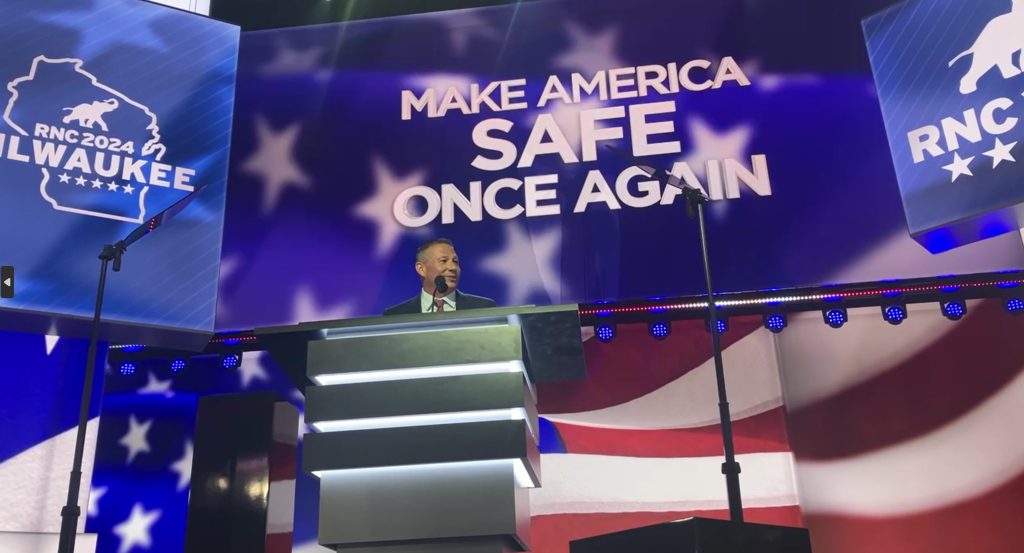Podcast: Play in new window | Download | Embed
Photo: Shaun Griswold / Source NM
The leader of the Forest County Potawatomi spoke to the Republican National Convention Tuesday night — supporting community safety.
Chuck Quirmbach of station WUWM reports from Fiserv Forum in Milwaukee, Wisc.
The Forest County Potawatomi is on the host committee for the Republican convention and held an RNC event at its Milwaukee casino.
Tribal Chairman James Crawford told delegates that the convention is in a region that is traditional Potawatomi homeland.
“Our ancestors occupied these lands for hundreds of years. Fishing area rivers and lakes. Hunting the land. Tapping maple tree groves for sugar. And harvesting crops in fields each fall.”
Chairman Crawford says today, the tribe is an essential part of the Milwaukee community.
He says like all other U.S. tribes, the Potawatomi have a desire and need to keep their people safe, but face real threats.
“The growing use and abuse of illegal drugs are claiming countless lives on reservations across this country. And Native American women and girls continue to be exploited, trafficked and subjected to violence at reprehensible levels. “
Chairman Crawford spoke on a night that convention planners dubbed Make America Safe Again.
He did not endorse GOP Presidential nominee Donald Trump during the speech.
President Joe Biden defeated Trump by about 20,000 votes in Wisconsin four years ago.
 Roselyn Tso, the highest-ranking administrator of the Indian Health Service, stopped by a Montana health center last week to see how organizers in the state’s largest city are using federal dollars to improve access to healthcare.
Roselyn Tso, the highest-ranking administrator of the Indian Health Service, stopped by a Montana health center last week to see how organizers in the state’s largest city are using federal dollars to improve access to healthcare.
Yellowstone Public Radio’s Kayla Desroches reports.
Staff led the Director of the Indian Health Service on a tour of the Billings Urban Indian Health and Wellness Center.
The health and wellness center’s parent company, the Native American Development Corporation, bought the building two years ago.
For many years, it was the local headquarters of the fraternal organization Shriners and an event venue.
Now, it’s the Eagle Seeker Community Center – and still growing into its new role.
The Indian Health Service last year invested an additional $200,000 to help fix and expand the building.
IHS director Roselyn Tso noted: “So, certainly our role and our responsibility is to provide care where we can to the people that we serve.”
As an urban Indian organization, the health and wellness center uses a mix of grants, IHS dollars and insurance reimbursement to fund culturally-informed medical services including psychiatric treatment and physical check-ups.
“With regards to insurance. Y’know that’s what we’re talking about – you heard some of that conversation earlier today. (We’re) doing everything we can to encourage our population to be enrolled in those programs that they might be eligible for, like Medicaid and Medicare. Those kinds of services. That’s what we do and that’s how we’re trying to make sure everyone has care that they need.”
Administrators with the Native American Development Corporation say around 60% of clinic patients lost Medicaid coverage through the process of unwinding.
They say they’re making it a priority to help those who seek their services to re-enroll.

Tribal leaders meet with U.S. Sen. Mark Kelly (D-AZ) on June 5, 2024, to advocate for the Northeastern Arizona Indian Water Rights Settlement Act. (Courtesy Navajo Nation)
Leaders from the Navajo Nation, Hopi Tribe, and San Juan Southern Paiute Tribe are gathering in Phoenix, Ariz. Wednesday to discuss a historic water settlement.
The Northeastern Arizona Indian Water Rights Settlement Act of 2024 has been introduced in Congress to authorize and approve the settlement and fund $5 billion for essential water projects.
Leaders will sign the settlement agreement in-person at the event.
Get National Native News delivered to your inbox daily and stay up-to-date on the 2024 Native Vote. Sign up for our daily newsletter today.




